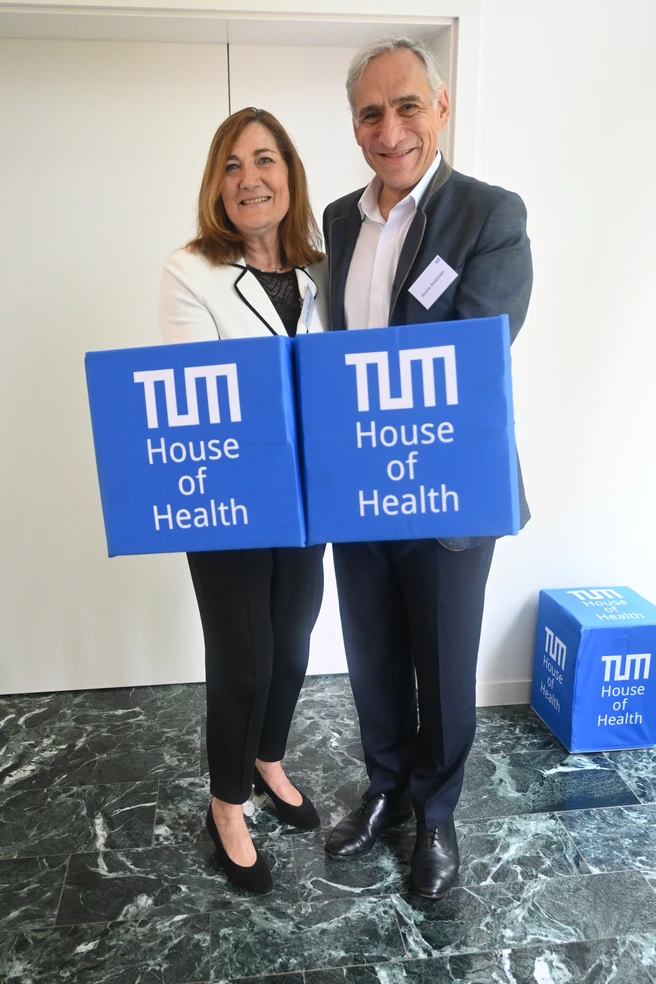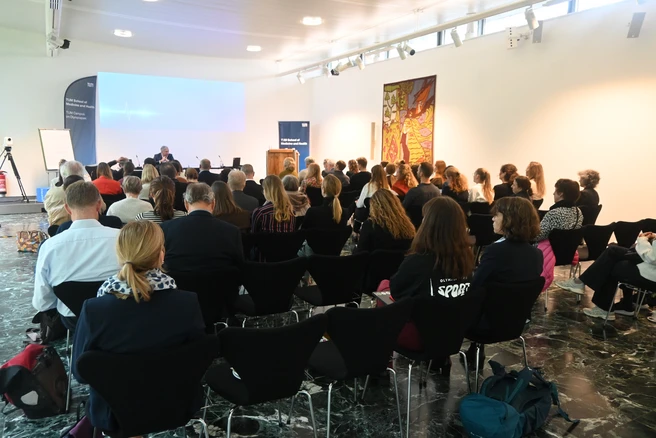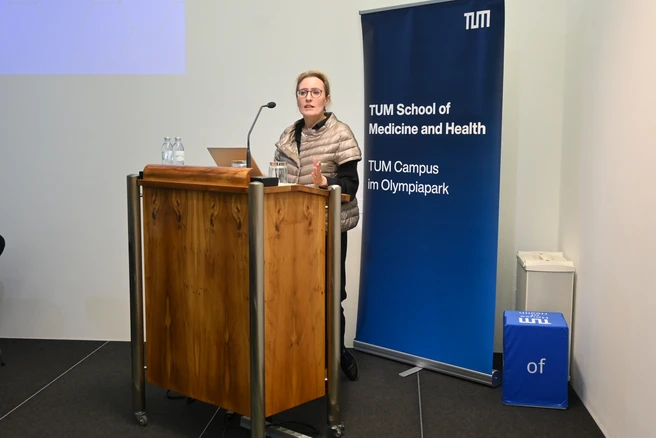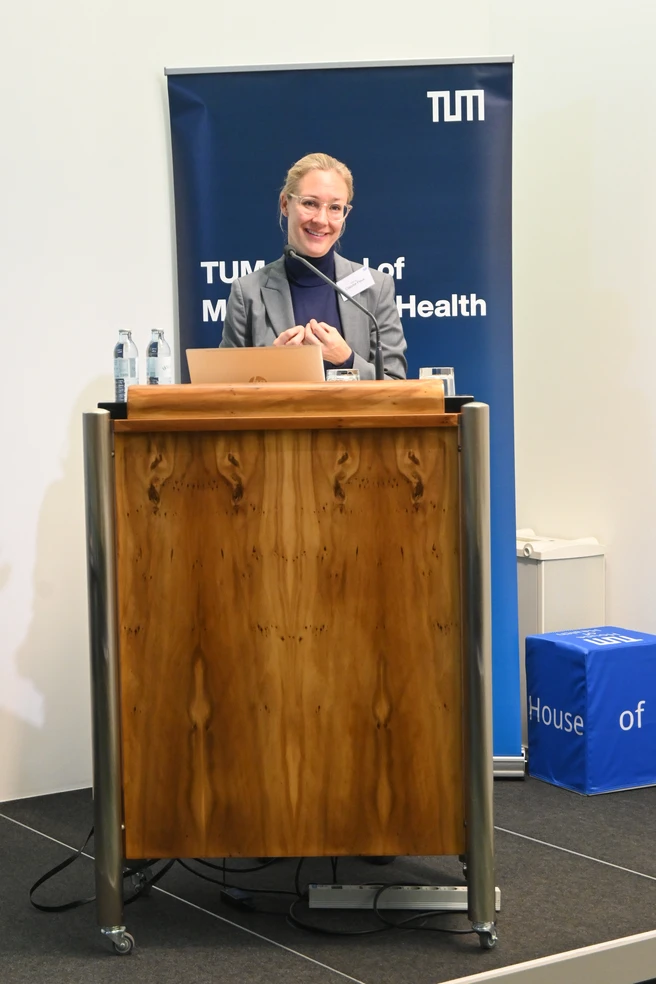With the theme “Future of Health – The Role of Talent Management and Diversity in Fostering Healthy Universities,” the 4th Future of Health Summit organized by the Department of Health and Sport Sciences on Thursday, October 9, 2025, focused on a truly forward-looking topic. The event, held at the Carl Friedrich von Siemens Foundation near Nymphenburg Palace, showcased through six panels and 16 speakers from Germany, the United Kingdom, the United States, and Qatar how closely health, leadership culture, and diversity are intertwined within university structures.
The event was held under the patronage of Judith Gerlach, Bavarian State Minister for Health, Care, and Prevention. In her video message, she emphasized that talent management and diversity are topics of utmost relevance. Gerlach noted that in light of demographic change, shortages of skilled workers, and growing workloads, the world of work is transforming at a rapid pace. She stated that “health is not just a nice add-on. Health has to be seen as a key competitive factor where performance, motivation or work quality are concerned, no sustainable corporate culture can exist without healthy and committed employees. However, good health does not just happen by chats, rather we all can do something to stay healthy and prevention holds the key role in this. With today’s conference you are contributing towards improving health and working environments and thus towards better health in the future.”
From the very beginning of the hybrid Summit - with 180 participants attending on-site or online - it became clear that universities are far more than places of teaching and research. The well-being of students, researchers and staff depends heavily on whether structures exist that value diversity, ensure equal opportunities and promote a sustainable culture of leadership.
“The ‘Future of Health Summit’ is a key component of the strategy to position the TUM School of Medicine and Health as a pioneer in prevention, health promotion, and interdisciplinary collaboration,” explained Prof. Dr. Stephanie Combs, Dean of the TUM School of Medicine and Health. “This is not just where ideas are born, but where concrete initiatives such as the ‘TUM House of Health’ are launched - projects that sustainably strengthen the well-being of the entire university community. Especially in medicine, it is the responsibility of universities not only to research and teach, but also to create a work environment that embraces diversity and actively promotes health.”
“Health and lived diversity are not side issues but strategic priorities,” said Prof. Dr. Renate Oberhoffer, main organizer of the Summit and Vice Dean for Talent Management and Diversity. “Universities are living and working spaces for students, researchers and staff. When structures are created that secure equal opportunity and value diversity, an environment emerges in which talent can not only thrive but flourish sustainably.”
In the first session, Prof. Dr. Claudia Peus, TUM Vice President for Talentmanagement and Diversity, emphasized that healthy leadership and lived diversity are essential prerequisites for resilience, motivation, and innovation. Talent management, she noted, must go beyond efficiency and short-term results to include long-term health, opportunities for growth, and the representation of diverse perspectives.
The second session, chaired by André Andonian, Senior Partner Emeritus at McKinsey & Company and co-organizer of the Summit alongside Prof. Oberhoffer, provided empirical evidence that good work and good health are inseparable. Among others, Prof. Lord Ara Darzi, Director of the Institute of Global Health at Imperial College London, demonstrated in his presentation that flexible work models, psychological safety and equitable participation not only promote well-being but also increase productivity and quality.
In the afternoon, workplace addiction prevention took center stage. In a discussion moderated by Prof. Dr. Jörg Wolstein, head of the Chair of Pathopsychology at the University of Bamberg, industry examples were presented showing how low-threshold support services and safe spaces for assistance can be effectively designed. Especially in high-pressure academic environments, preventive structures and early intervention are crucial.
Another key focus of the Summit was gender and diversity. Contributions from gender-sensitive medicine and academic health studies underscored that health and career opportunities differ by gender and must be addressed specifically. Diversity-oriented prevention, speakers argued, is not an optional add-on but a core component of a healthy university.
Additionally, Dr. Klaus Kleinfeld, former CEO of Siemens AG and entrepreneur, and André Andonian spoke in a panel on sustainable success - both professionally and personally. Following this, representatives from Analog Devices (semiconductor industry), the US-based biotechnology firm Flagship Pioneering, and the global leadership advisory firm Russell Reynolds Associates presented best practices in sustainable talent management - approaches that inherently include health management. Universities, they concluded, can learn from these examples to evolve their own institutional cultures in a future-oriented way.
A highlight at the conclusion of the Summit was the presentation of the new “TUM House of Health” - an institutional milestone that systematically embeds health within the university’s structures and makes clear that health and diversity are strategic imperatives. “With the ‘TUM House of Health’, the university is sending a strong signal: health and diversity are foundational pillars of a modern university. These topics are being institutionalized to ensure their systematic development and to foster a culture that not only imparts knowledge but also protects and enhances the well-being of all its members,”, explained Prof. Oberhoffer
To the “Future of Health Summit” and the program overview
To the homepage of TUM Sport and Health for Life
To the homepage the “TUM House of Health”
Contact:
Prof. Dr. Renate Oberhoffer
Vice Dean Talent Management and Diversity
Chair of Preventive Pediatrics
Am Olympiacampus 11
80809 München
phone: 089 289 24570
e-mail: renate.oberhoffer(at)tum.de
TUM Sport and Health for Life
Continuing education and training at the TUM School of Medicine and Health
Am Olympiacampus 11
80809 München
phone: 089 289 24732
e-mail: summit.lpp(at)mh.tum.de
Text & Photos: Romy Schwaiger



